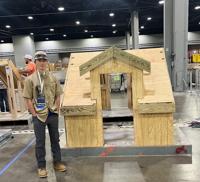An often unseen issue in Georgia is the high number of children who are abandoned at hospitals or residential care facilities following treatment for a complex and sometimes intense psychiatric diagnosis.
The problem starts when children are admitted to a care facility for an intense episode or crisis situation where they may be exhibiting dangerous behaviors, and once admitted, their guardian disengages, leaving them in the care of the facility. Once the child finishes treatment they have nowhere to go and they are left with the state and are then subjected to a long process of rehoming and finding resources and services to help.
“So the child arrives in crisis, and that can usually be stabilized in three to five days, and that���ӽ紫ý considered medical,” Rep. Katie Dempsey, R-Rome, said. “Then once that���ӽ紫ý done, it���ӽ紫ý time to go back to a different place, but there isn’t a place for them to go, that���ӽ紫ý where we are.”
It is a prevalent issue that State Representative Dempsey has decided to take on.
Despite the way it sounds, these cases of abandonment aren’t cut and dry, with the caregivers saying they’ve had enough and dropping their children off at a hospital, Dempsey said. Often times, the parent or guardian has tried to find help but has reached the point where it is no longer safe or conducive to have the child at home.
“It���ӽ紫ý that someone has reached the end of their rope through lots and lots of trials, whether it���ӽ紫ý through the foster system or other avenues,” she said. “This is not unique to Georgia, it���ӽ紫ý around the country where children with mental health issues languish in hospitals, sometimes for months, sometimes over a year, after they’ve been medically discharged.”
Many factors contribute to the problem, including the lack of resources for children and families in need, as well as existing policies that delay proceedings and make the state���ӽ紫ý responsibilities in these cases unclear.
One thing that muddies the responsibilities of government organizations like the ���ӽ紫ý of Family and Child Services or the Georgia ���ӽ紫ý of Behavioral Health and Developmental Disabilities is how the law defines abandonment and the process that���ӽ紫ý undergone before abandonment can be claimed.
“The clock starts when someone doesn’t come to take the child, and there are six months that DFCS has to wait to declare abandonment,” Dempsey said.
During that time the state is tasked with finding a relative to take the child. The long time frame leaves the child in a type of limbo where they have already received the immediate care they need but have nowhere to go. In some cases, the child remains in care facilities after their discharge or is placed in DFCS custody and temporarily housed in hotels.
Legislator���ӽ紫ý fight
It is an issue that has persisted for years, and last year, Dempsey worked on a bill to address it. During the legislative session, the bill went through numerous revisions before it was decided that it needed more work. However, the revisions to the bill brought attention to the issues, bringing more legislators to the table to discuss it.
A subcommittee was then created to analyze the issue and the current services and resources available to address it. Dempsey chairs the House Study Committee on Abandoned Child Placement.
“This is going to take a look at it, we’re gonna try to create a process to address this growing problem,” Dempsey said. “I’m excited about getting to look into it and learning more myself about what we can do to change this.”
A large priority for the committee, Dempsey said, is improving access to resources to address this issue before it happens.
“We’re also going to be looking at some of the wrap-around services,” Dempsey said. “What do we need to do to help it not get to this point? To help parents with their biological child and our DFCS families to be equipped to handle this.”
The committee will meet at the Capitol after Labor Day and spend three days in discussion. In the time leading up to the September meeting, Dempsey, with the assistance of her policy analyst, Amber Mack, will research the existing policies that may contribute to the issue and seek advice from experts in the field.
“We have to come up with more plans and try to help whoever has agreed to help raise this very challenging minor to have all of the support services they need to be able to feel like they could,” she said.
While the committee is comprised of only five members, including Dempsey, the Rome legislator has heard from fellow lawmakers who want to be part of the conversation. The committee is only allowed three days to meet but Dempsey was confident that three long days could be very productive.






























(0) comments
Welcome to the discussion.
Log In
Keep it Clean. Please avoid obscene, vulgar, lewd, racist or sexually-oriented language.
PLEASE TURN OFF YOUR CAPS LOCK.
Don't Threaten. Threats of harming another person will not be tolerated.
Be Truthful. Don't knowingly lie about anyone or anything.
Be Nice. No racism, sexism or any sort of -ism that is degrading to another person.
Be Proactive. Use the 'Report' link on each comment to let us know of abusive posts.
Share with Us. We'd love to hear eyewitness accounts, the history behind an article.